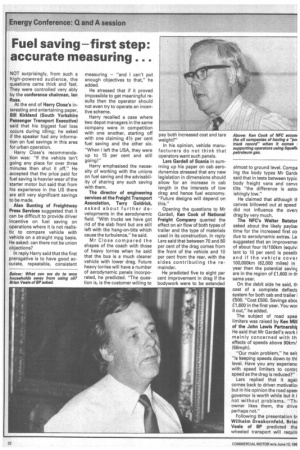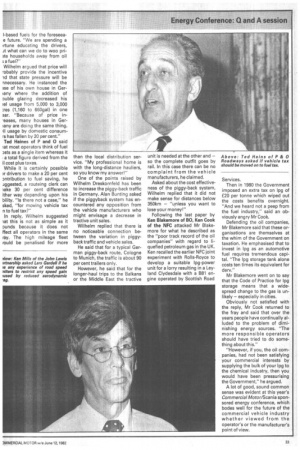Fuel saving-first step: accurate measuring . . .
Page 26

Page 27

If you've noticed an error in this article please click here to report it so we can fix it.
NOT surprisingly, from such a high-powered audience, the questions came thick and fast. They were controlled very ably by the conference chairman, Ian Ross.
At the end of Harry Close's interesting and entertaining paper, Bill Kirkland (South Yorkshire Passenger Transport Executive) said that his biggest fuel loss occurs during idling; he asked if the speaker had any information on fuel savings in this area for urban operation.
Harry Close's recommendation was: "If the vehicle isn't going any place for over three minutes then shut it ,off." He accepted that the price paid for fuel saving is heavier wear of the starter motor but said that from his experience in the US there are still very significant savings to be made.
Alan Bunting of Freightway Press Services suggested that it can be difficult to provide driver incentive on fuel saving on operations where it is not realistic to compare vehicle with vehicle on a straight mpg basis. He asked: can there not be union objections?
In reply Harry said that the first prerogative is to have good accurate, repeatable, consistent measuring — "and I can't put enough objectives to that," he added, He stressed that if it proved impossible to get meaningful results then the operator should not even try to operate an incentive scheme.
Harry recalled a case where two depot managers in the same company were in competition with one another, starting off with one claiming 41/2 per cent fuel saving and the other six.
"When I left the USA, they were up to 15 per cent and still going!"
Harry emphasised the necessity of working with the unions on fuel saving and the advisability of sharing any such saving with them.
The director of engineering services at the Freight Transport Association, Terry Goldrick, asked about further developments in the aerodynamic field. "With trucks we have got rid of the slab front but are still left with the hang-on-bits which cause the turbulence," he said.
Mr Close compared the shapes of the coach with those of heavy lorries when he said that the bus is a much cleaner vehicle with lower drag. Future heavy lorries will have a number of aerodynamic panels incorporated, he predicted. "The question is, is the customer willing to pay both increased cost and tare weight?"
In his opinion, vehicle manufacturers do not think that operators want such panels.
Lars Gardell of Scania in summing up his paper on cab aerodynamics stressed that any new legislation in dimensions should allow for an increase in cab length in the interests of low drag and hence fuel economy. "Future designs will depend on this."
Opening the questions to Mr Gardell, Ken Cook of National Freight Company queried the effect on air flow of both types of trailer and the type of materials used in its construction. In reply Lars said that between 70 and 80 per cent of the drag comes from the front of the vehicle and 10 per cent from the rear, with the sides contributing the remainder.
He predicted five to eight per cent improvement in drag if the bodywork were to be extended almost to ground level. Compa ing the body types Mr GardE said that in tests between typic body freight vans and canvE tilts "the difference is astor ishingly low."
He claimed that although t) canvas billowed out at speed did not influence the over drag by very much.
The NFC's Walter Batstor asked about the likely paybac time for the increased first co due to aerodynamic extras. La suggested that an improvemei of about four lit/100km (equivi lent to 10 per cent) is possib and if the vehicle cover 100,000km (62,000 miles) in year then the potential savinc are in the region of £1,600 in th same year.
On the debit side he said, th cost of a complete deflectc system for both cab and trailer i £500. "Cost £500. Savings aboi £1,600 in the first year. You wor it out," he added.
The subject of road spec limiters was raised by Ken Mill of the John Lewis Partnershir He said that Mr Gardell's work i mainly concerned with th effects of speeds above 90km/ (56mph).
"Our main problem," he sal( "is keeping speeds down to thi level. Have you any experieno with speed limiters to contrc speed as the drag is reduced?"
Lars replied that it agaii comes back to driver motivatioi but in his opinion the road speer governor is worth while but it i not without problems. "Thi owner likes them, the drive perhaps not."
Following the presentation IT Wilhelm Dreskornfeld, Brim Veale of BP predicted tha wheeled transport will requin
l-based fuels for the foreseeae future. "We are spending a irtune educating the drivers, Jt what can we do to woo priyte households away from oil a fuel?"
Wilhelm argued that price will robably provide the incentive id that state pressure will be rinecessary. He instanced the ise of his own house in Geriany where the addition of ouble glazing decreased his iel usage from 5,000 to 3,000 res (1,160 to 660ga1) in one 3ar. "Because of price invases, many houses in Gerlany are doing the same thing.
■ il usage by domestic consumrs has fallen by 20 per cent." Ted Haines of P and 0 said let most operators think of fuel 3sts as a single item whereas it a total figure derived from the il cost plus taxes.
While it is certainly possible w drivers to make a 20 per cent pritribution to fuel saving, he Jggested, a routeing clerk can lake 30 per cent difference ither way depending upon his bility. "is there not a case," he sked, "for moving vehicle tax n to fuel tax?"
In reply, Wilhelm suggested at this is not as simple as it ounds because it does not ffect all operators in the same ray. The high mileage fleet rould be penalised for more than the local distribution service, "My professional home is with the long-distance hauliers, so you know my answer!"
One of the points raised by Wilhelm Dreskornfeld has been to increase the piggy-back traffic in Germany. Alan Bunting asked if the piggyback system has encountered any opposition from the vehicle manufacturers who might envisage a decrease in tractive unit sales.
Wilhelm replied that there is no noticeable connection between the variation in piggyback traffic and vehicle sales.
He said that for a typical German piggy-back route, Cologne to Munich, the traffic is about 90 per cent trailers only.
However, he said that for the longer-haul trips to the Balkans or the Middle East the tractive unit is needed at the other and — so the complete outfit goes by rail. In this case there can be no complaint from the vehicle manufacturers, he claimed.
Asked about the cost effectiveness of the piggy-back system, Wilhelm replied that it did not make sense for distances below 350km — "unless you want to lose your money!"
Following the last paper by Ken Blakemore of BO, Ken Cook of the NFC attacked Mr Blakemore for what he described as the "poor track record of the oil companies" with regard to liquefied petroleum gas in the UK. Ken recalled the earlier NFC joint experiment with Rolls-Royce to develop a suitable log-power unit for a lorry resulting in a Leyland Clydesdale with a B81 engine operated by Scottish Road Services.
Then in 1980 the Government imposed an extra tax on lpg of EN per tonne which wiped out the costs benefits overnight. "And we heard not a peep from the fuel industry," said an obviously angry Mr Cook.
Defending the oil companies, Mr Blakemore said that these organisations are themselves at the whim of the Government on taxation. He emphasised that to invest in log as an automotive fuel requires tremendous capital. "The lpg storage tank alone costs ten times its equivalent for derv."
Mr Blakemore went on to say that the Code of Practice for lpg storage means that a widespread change to the gas is unlikely — especially in cities.
Obviously not satisfied with the reply, Mr Cook returned to the fray and said that over the years people have continually alluded to the problem of diminishing energy sources. "The more responsible operators should have tried to do something about this."
"However, if you, the oil companies, had not been satisfying your commercial interests by supplying the bulk of your lpg to the chemical industry, then you would have been pressurising the Government," he argued.
A lot of good, sound common sense was evident at this year's Commercial Motor/Scan ia sponsored energy conference, which bodes well for the future of the commercial vehicle industry whether viewed from the operator's or the manufacturer's point of view.






















































